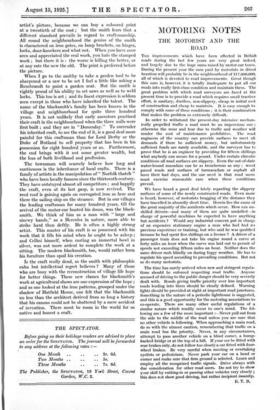MOTORING NOTES
THE MOTORIST AND THE ROAD
TEE improvements which have been effected in British roads during the last few years are very great indeed, and largely due to the huge sums raised by motor-car taxes.
During the present year the sum paid by motorists in direct taxation will probably be in the neighbourhood of £17,000,000, all of which is devoted to road improvements. Great though this sum is, however, it is totally inadequate to put all our roads into really first-class condition and maintain them. The
great problem with which road surveyors are faced at the present time is to provide a road which requires small tractive effort, is sanitary, dustless, non-slippery, cheap in initial cost of construction and cheap to maintain. It is easy enough to comply with some of these conditions ; it is their combination that makes the problem so extremely difficult.
In order to withstand the present-day intensive mechan- ically propelled traffic a road must be an impervious one ; otherwise the wear and tear due to traffic and weather will render the cost of maintenance prohibitive. The road engineers of the country can provide surfaces to meet all demands if there be sufficient money, but unfortunately sufficient funds are rarely available, and the surveyor has to prove that he is an engineer by providing for fifteen shillings what anybody can secure for a pound. Under certain climatic conditions all road surfaces are slippery. Even the out-of-date water-bound macadam can be as treacherous as any ; wood paved roads and surfaces of tarmaeadam or asphalt all have their bad days, and the one need is that road users must exercise reasonable care when these conditions prevail.
We have heard a great deal lately regarding the slippery surfaces of some of the newly constructed roads. Even more is heard, however, of motorists bragging of the distance they have travelled in absurdly short time. Herein lies the cause of the great majority of the accidents which occur. How can un- skilled drivers—and many of them are quite unskilled—in charge of powerful machines be expected to have anything but accidents ? Would any industrial concern put in charge of an expensive stationary engine a man who had had no previous experience or training, but who said he was qualified because he had spent five shillings on a licence ? A driver of a passenger train does not take his engine round a curve at forty miles an hour when the curve was laid out to permit of speeds not exceeding fifteen miles an hour. Neither does the same driver rush blindly on during foggy weather. He has to regulate his speed according to prevailing conditions. But not so do many motorists.
The time has surely arrived when new and stringent regula- tions should be enforced respecting road traffic. Anyone accused of driving to the public danger should be very severely dealt with. Roads giving traffic priority over less important roads leading into them should be clearly defined. Warning lights should be provided at night at important road junctures. Something in the nature of a periodic lighthouse is suggested, and this is a good opportunity for the motoring associations to co-operate. There are many other useful regulations of a similar nature which readily occur to one's mind. The fol- lowing are a few of the more important :—Never pull out from the side to the middle of the road unless you are sure that no other vehicle is following. When approaching a main road, do so with the utmost caution, remembering that traffic on a main road has the priority. Never, in any circumstances, attempt to pass another vehicle on a blind corner, a hump- backed bridge or at the top of a hill. If your car be fitted with rear brakes only, do not follow too closely a car fitted with four- wheel brakes. Be very careful when meeting or overtaking cyclists or pedestrians. Never park your car on a bend or corner and make sure that firm ground is selected. Learn and employ all the recognized traffic signals. Drive always with due consideration for other road users. Do not try to show your skill by cutting-in or passing other vehicles very closely ; this does not show good driving, but rather incipient insanity.
E. T. B.






































 Previous page
Previous page